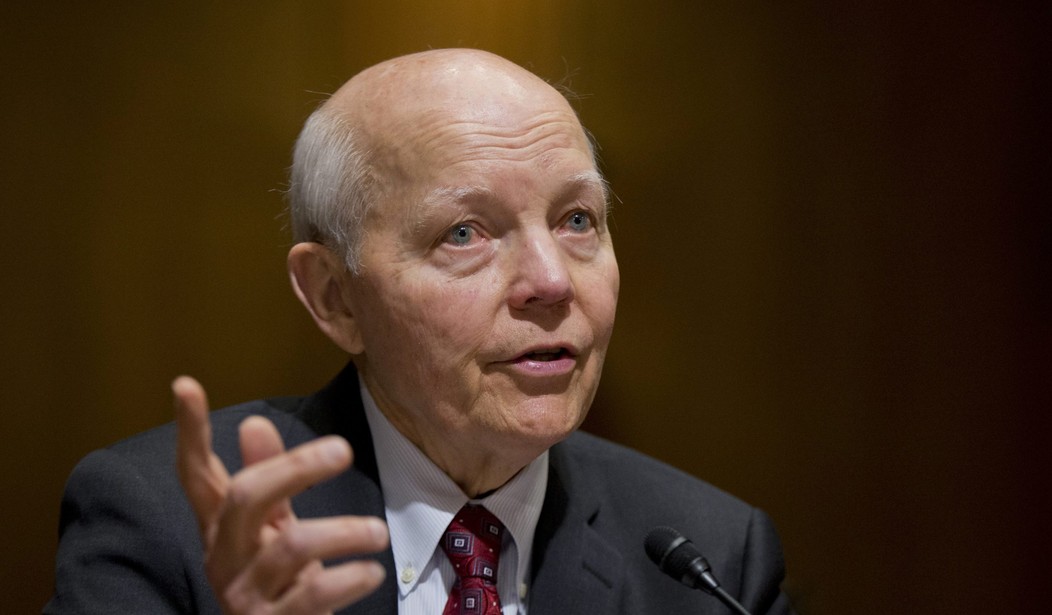Aetna Inc. Chief Executive Officer Mark Bertolini says that Obamacare is in a “death spiral.” Congressional Republicans, haltingly and confusedly, move toward some kind of Obamacare repeal with a possible replacement of…something.
For those who question whether the GOP will actually get the job done on Obamacare, you can relax. Donald Trump won’t let there be any backsliding, as he has made repeal one of his primal policy thrusts in his first term.
So it’s not surprising that the IRS has read the writing on the wall and is now relaxing enforcement of the individual Obamacare mandate that everyone must have insurance.
The IRS will not require that tax returns indicate that a person has health insurance under Obamacare — a decision that Reason magazine called a major blow to the law’s individual mandate.
In a statement to Reason, which first reported the policy Tuesday night, the IRS said it was responding to an order from President Trump to reduce the Affordable Care Act’s burdens on the American taxpayer.
“The recent executive order directed federal agencies to exercise authority and discretion available to them to reduce potential burden,” the IRS said in its statement. “Consistent with that, the IRS has decided to make changes that would continue to allow electronic and paper returns to be accepted for processing in instances where a taxpayer doesn’t indicate their coverage status.”
For most people, the proof that they have complied with the individual mandate to buy insurance is indicating such to the IRS on Line 61 of the 1040 form. Starting this year, the Obama administration had ordered the agency to start rejecting as invalid returns that didn’t fill out Line 61 or address the alternatives to not having health insurance, such as paying the tax penalty.
That is apparently no longer the case.
The IRS says taxpayers are still legally required to have health insurance or pay the penalty. It also maintains that it still has discretion to follow up on a filer not indicating his health-insurance coverage status but, according to Reason, it’s not clear what would cause the agency to do that.
Peter Suderman explains:
Although the new policy leaves Obamacare’s individual mandate on the books, it may make it easier for individuals to go without coverage while avoiding the penalty. Essentially, if not explicitly, it is a weakening of the mandate enforcement mechanism.
“It’s hard to enforce something without information,” says Ryan Ellis, a Senior Fellow at the Conservative Reform Network.
The move has already raised questions about its legality. Federal law gives the administration broad authority to provide exemptions from the mandate. But “it does not allow the administration not to enforce the mandate, which it appears they may be doing here,” says Michael Cannon, health policy director at the libertarian Cato Institute. “Unless the Trump administration maintains the mandate is unconstitutional, the Constitution requires them to enforce it.”
“The mandate can only be weakened by Congress,” says Ellis. “This is a change to how the IRS is choosing to enforce it. They will count on voluntary disclosure of non-coverage rather than asking themselves.”
The IRS notes that taxpayers are still required to pay the mandate penalty, if applicable. “Legislative provisions of the ACA law are still in force until changed by the Congress, and taxpayers remain required to follow the law and pay what they may owe,” the agency statement said.
Ellis says the new policy doesn’t fully rise to the level of declining to enforce the law. “If the IRS turns a blind eye to people’s status, that isn’t quite not enforcing it,” he says. “It’s more like the IRS wanting to maintain plausible deniability.”
One would think that if, in the course of an IRS audit, it was discovered you had no insurance and did not pay the penalty, that might be one avenue of enforcement.
But unless the IRS comes up with alternate enforcement procedures, it would seem that this is the beginning of the end of the individual mandate. If the IRS isn’t going to enforce the mandate, why keep it?
When Congress finally gets its act together on what to do about Obamacare, the very first action they should take is to get rid of what is now a useless appendage to a useless program.










Join the conversation as a VIP Member